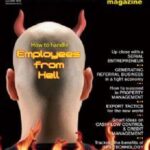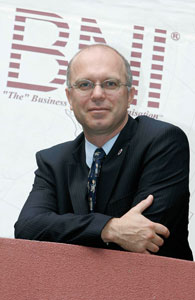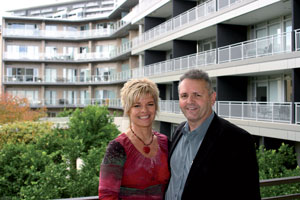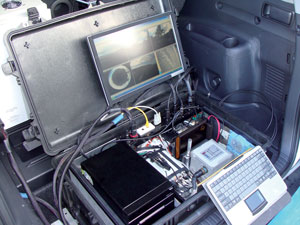Up close with a serial entrepreneur
Melissa Clark-Reynolds talks about the keys to business survival, her passion for sustainability, a fun new virtual world for children and other entrepreneurial endeavours. By Patricia Moore.
|
Being the brightest in class isn’t always easy. When you’re also a shy and insecure teenager it becomes even harder. The solution for Melissa Clark-Reynolds was to “blend in by not doing any work” (kids, ask your parents first!) Clark-Reynolds hopes gifted kids have it a little easier today but fears there are still teachers out there who think ‘good enough’ is, well, good enough. So, rather than repeat seventh form, “I’d been bored senseless for most of my secondary schooling anyway”, she fudged the question of her age to her friends, enrolled at Massey, and became New Zealand’s youngest ever female university student. “I threw myself into university life; swimming, running, radio shows, the student newspaper. I was elected to the Massey Students Association exec at 16 and later was on the It may not sound like the ideal entrepreneurial training ground, but out of it has emerged a woman who’s been described as ‘a serial entrepreneur’. It’s a terrifying label says Clark-Reynolds. “Most of us do it once and don’t tempt fate by doing it again in case the first time was a fluke. I wear the badge with pride.” A track record of success in a wide range of entrepreneurial endeavours proves it was no accident. The fact that Clark-Reynolds is a female entrepreneur also makes her something of an oddity. It’s the only role which pays a woman what she’s worth, she says. “As an entrepreneur you are paid exactly what the market determines. In a job I have never had equal pay. The Herald recently published stats on New Zealanders are among the most entrepreneurial people in the world, she believes. “Where we let ourselves down is by not celebrating people who do great stuff. We need to give people more room to try, fail and try again – worth noting at a time when many small, and indeed, not so small, enterprises find themselves faced with the prospect of failing. “People need to be given space to recover, then to start again, to learn, learn, learn and have another go.” She believes our culture supports neither learning nor failure and we’re too ready to accept a level of mediocrity which stops many “Good enough is OK, so they stop.” After graduating from Victoria University (BA Hons – in spite of her social life), Clark-Reynolds attended Rutgers University in the United States where she completed a combined Masters Degree in Health & Environmental Studies. For the first time in her young life learning was a challenge – and she discovered being bright was a blessing not a burden and having a good mind was something to be proud of. “We could learn from the competitive aspect of the education system in the States. Make the cut each semester or go home! “I worked my butt off and proved the doubting professors wrong when they said I couldn’t take masters level toxicology or epidemiology without undergraduate organic chemistry or math. This was the best training I could have had as an entrepreneur.” Back home Clark-Reynolds worked as a consultant in her specialist areas before testing her entrepreneurial wings and establishing Fusion, the company which became Since then there have been a string of projects, in (How to survive the recession is one of the areas she likes to address through her work on the speaker circuit with Celebrity Speakers. “I’ve been through a few of these now: 1987, the 1997 collapse of the Asian banking system when I had a company in So don’t use the current downturn as an excuse around Clark-Reynolds. She’ll quote Kiyosaki (Rich Dad Poor Dad) at you; ‘It’s always a good time to make money’, and remind you that Rockefeller made his money in a depression. “Businesses with good fundamentals survive and often thrive in bad economies, lazy ones die. It’s kind of a Those fundamentals include a ‘must have’ product, an established revenue model, an understanding of how market uptake works and customers who have the ability to pay. Businesses need to know exactly who their customers are, understand the problems they have and have a value proposition which will solve it for them, she says. It’s also important to have a business model for solving those problems and to consider the kind of relationship they want with customers. “Is it market or product driven – in my experience the product driven companies have a much harder road. “Overall businesses need to know where they are going, use resources efficiently – waste, water, transport, energy etc – and raise productivity through good relationships with staff, community, suppliers, and, most of all, customers.” In 2002 Clark-Reynolds was listed among But what does powerful mean to her? “I hope I can effect change.” A passion for sustainability One way Clark-Reynolds has been working on effecting change is through her passion for environmental issues. This has seen her become one of only two New Zealanders, chosen by Al Gore, to present the slideshow from An Inconvenient Truth. It’s been adapted for Clark-Reynolds would like to see more businesses increasing their focus on sustainability. “Join the Sustainable Business Network – their Sustainable Business Challenge is a great place to get going. “Let’s face it though; we are not going to solve things by changing our light bulbs! We need to couple our individual and company actions with pressure on the government – local and national – to put in place policies we can count on.” |
Businesses need as much certainty as possible to plan their own investment in their business, she says. “We need an emissions trading scheme and we need the detail soon. In my opinion it needs to be a cap and trade system which means business knows what is expected from it regarding carbon equivalent emissions. “We need to be using the resources we have efficiently, and planning our businesses. I see a lot of companies here which don’t have a business plan and don’t really know how to build a business which can make a profit long term. Long term profits go hand-in-hand with sensible use of resources and strong community relationships.” ‘Greenwashing’ (the unjustified appropriation of environmental virtues) won’t wash, she says and cites recent dealings with two different companies regarding their environmental claims as examples of the good and the bad. “I emailed Dilmah Tea because the tea bags I had bought seemed to be made from polyester and I didn’t want to put them in my compost. They handled it really well and even sent me a presentation showing photographs of the tea bags, actually made from corn starch, in varying phases of decomposition. I will buy again.” The second incident involved the integrity of the message the producer of a well-known brand of bottled water was sending. It’s a product she rarely buys but, when forced to, tried to do the right thing. Honestly. The bottle referred consumers to their website for more information on the disposal of the bottles. This was not in fact available. But following an email from Clark-Reynolds it appeared and explained that a number of city councils collect the bottles – but it didn’t explain that they don’t recycle them. “They then let me know the bottles are compostable.” Unfortunately the conditions for this to take place do not currently exist in “I find this dishonest and I think consumers will rebel against this kind of thing. I won’t be buying again.” Sustainability is one of the messages Clark-Reynolds is promoting through her latest venture, minimonos.com – a project involving a team of six around “It’s a virtual world for children; a place of fun, beauty, discovery, generosity, sustainability and friendship. We created minimonos so children will have a place of their own, one that allows them to explore and grow, without constant pressure to buy stuff.” She says it’s a place that embodies core values like sustainability and generosity, “without turning those values into a boring lecture.” Minimonos is currently pre-Alpha. “We’re collecting support and still getting things together.” They’ve been receiving some great comments from parents she says – almost exclusively from people not known to them – and are in the process of collecting their first 100 children to test the site’s development and ideas. The plan is to go live later this year. “We’ve started on Twitter and Facebook. Within a few hours we had 50 followers on twitter; within a couple of weeks that had grown to 800. The Facebook page is growing as well – around 200 already. People follow us or join our page because they love our vision. That’s awesome!” Learning is her idea of fun, says Melissa Clark-Reynolds. “I seek out things I can’t do, stuff I find hard, and then learn. Learn everything I can.” Which was how she gravitated from epidemiology into business and IT. “I read everything. At the moment I’m re-reading Jung and Kerenyi, second year uni texts for me in 1981, and applying them to virtual world development. I’m also reading as much young adult fiction as I can. And I play. My first games were maths ones I made up for myself when I was six or so and first realised I was just marking time at school.” Powerful woman; serial entrepreneur. Melissa Clark-Reynolds doesn’t believe in sitting still and frankly admits that beating global warming is one of the challenges she’s most passionate about. “I’ve always been a beach girl and keen on the outdoors. I want future generations to have the experiences I have had; swimming, surfing, kayaking, skiing, enjoying the wonderful world we have around us.” She also aims to make minimonos.com the first social network parents actually want their children to join – and make it a Given her brains and entrepreneurial flair, and of course that power, it’s only a matter of time. Patricia Moore is an Auckland-based freelance writer. Email: [email protected] Websites to visit: www.sustainable.org.nz www.acfonline.org.nz www.minimomos.com www.csnz.so.nz |






